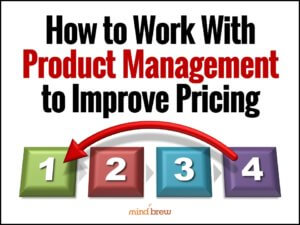As we’ve pointed out many times before, the quality and accuracy of the decisions being made upstream…in product management…can set limits or boundaries on pricing performance in the marketplace. In fact, a large proportion of an offering’s ultimate pricing power and potential can be “baked in” by product management long before a prospect even has a chance to see it.
Because these early decisions can act as a governor on pricing performance, it makes your job that much harder when product management is falling down, missing critical steps, and/or making ill-informed decisions.
But how do you know? How can you tell whether product management is helping or hindering in-market pricing performance? How can you tell whether product management is making your efforts more difficult than they really need to be?
In the on-demand webinar, Working with Product Management to Improve Pricing, we highlight a number of tell-tale signs, including:
- Product line performance is rarely as predicted. When targets and projections are constantly being missed, it can often be a symptom of poor planning processes and an overall lack of market understanding and customer insight.
- Sales training is largely about features and functions. What product management teaches the sales team can be extremely telling. If there’s nothing about the needs of different segments, crucial value drivers, key differentiators to relevant alternatives, etc., that’s a big red flag because it likely means they haven’t done the necessary homework.
- Product managers cite “textbook” pricing strategies. When product managers claim to be employing outdated strategies like penetration pricing or competitive price matching, that’s a pretty clear sign they aren’t up to speed on more effective value-based methods.
- Products are introduced with little pricing structure. When products are introduced with flat, one-size-fits-all pricing and no segmentation, no targeting, no volume schedules, etc., this is another indication that the requisite legwork just hasn’t been done.
- Product managers are as quick to discount as reps. Product managers who’ve done their homework will have a lot of confidence in the value propositions being put forward…and they won’t be eager to cave-in to pricing pressure. Conversely, product managers who haven’t done the homework will often rationalize making “adjustments in the field.”
If you’re seeing some (or all) of these tell-tale signs in your business, first understand that you’re not alone. Unfortunately, there are a number of dynamics inside a typical product management function that virtually guarantee that most pricing groups will find themselves in this situation to some degree.
Now, you shouldn’t get upset or angry about these deficiencies. Not publicly, anyway. Nor should you start pointing fingers or making accusations. That sort of thing might feel good in the moment, but it just makes people defensive and even more resistant to change. (And, it’s not a good look for you, internally.)
Instead, you should recognize the opportunity for improvement and get after it. As we discuss in the webinar, these deficiencies are not insurmountable. It’s not a quick fix, of course, but there are straightforward steps you can take to drive improvements and generate big performance gains.
















